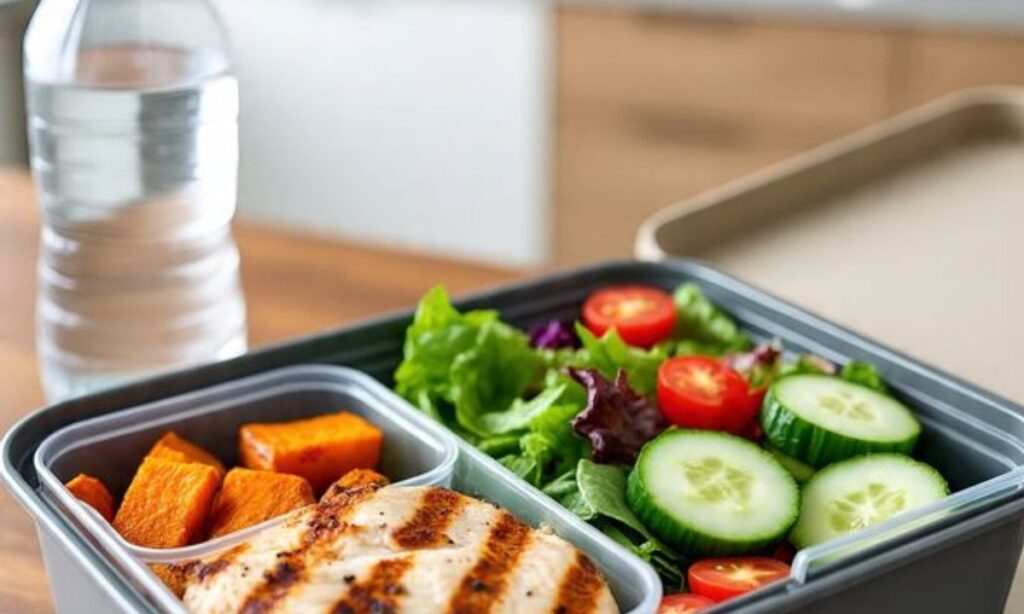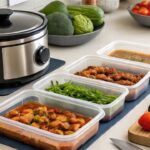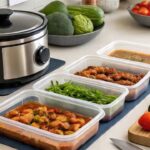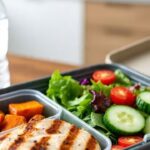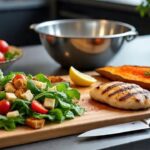Athletes lead busy lives packed with training sessions, travel, and competitions. With such a demanding lifestyle, maintaining a balanced and nutrient-rich diet is essential. Meal prepping ensures athletes get the right fuel at the right time without relying on unhealthy fast food or missing meals altogether. This guide offers practical tips, meal ideas, and strategies to help athletes efficiently prepare their food on the go.
Why Meal Prep Matters for Athletes
- Consistent Nutrition – Ensures optimal energy levels before and after workouts.
- Time Savings – Reduces daily cooking and decision-making.
- Better Recovery – Supports muscle repair with adequate protein and micronutrients.
- Cost-Effective – Buying in bulk and prepping reduces expenses.
- Improved Performance – Keeps athletes fueled with high-quality ingredients.
Key Components of Athlete Meal Prep
| Component | Importance for Athletes | Examples |
|---|---|---|
| Protein | Muscle recovery and repair | Chicken, turkey, salmon, eggs, tofu, Greek yogurt |
| Complex Carbs | Sustained energy for training and performance | Brown rice, quinoa, oats, sweet potatoes, pasta |
| Healthy Fats | Joint health and hormone balance | Avocado, nuts, seeds, olive oil, fatty fish |
| Vegetables/Fruits | Vitamins, minerals, and antioxidants | Broccoli, spinach, berries, oranges, peppers |
| Hydration | Maintaining performance and recovery | Water, coconut water, electrolyte drinks |
Meal Prep Strategies for Busy Athletes
1. Plan Your Week
- Create a meal plan based on training schedules.
- Use a grocery list to save time.
2. Cook in Bulk
- Cook protein, carbs, and vegetables in larger batches.
- Store them separately to mix and match throughout the week.
3. Use Portable Containers
- Invest in BPA-free, microwave-safe, compartmentalized containers.
- Label meals with dates for freshness.
4. Balance Macronutrients
- Each meal should contain protein + carbs + healthy fats.
- Add fruits and vegetables for micronutrients.
5. Pack Snacks
- Portable snacks like protein bars, trail mix, and Greek yogurt are ideal for travel days.
Sample Meal Prep Plan for Athletes on the Go
| Meal Time | Menu Idea | Notes |
|---|---|---|
| Breakfast | Overnight oats with chia seeds, almond butter, and berries | High fiber and sustained energy |
| Snack | Greek yogurt with granola and honey | Protein boost between workouts |
| Lunch | Grilled chicken with quinoa, broccoli, and olive oil drizzle | Balanced macros |
| Snack | Banana + peanut butter or a protein shake | Quick fuel pre-workout |
| Dinner | Salmon with sweet potato and green beans | Omega-3 and recovery carbs |
Quick Meal Prep Tips for Athletes
- Rotate ingredients to avoid boredom.
- Freeze extra portions to cover busy days or travel.
- Season smartly with herbs and spices for flavor without excess sodium.
- Stay organized by dedicating one day to meal prepping each week.
- Use slow cookers or Instant Pots for effortless bulk cooking.
Portable Snack Ideas
- Protein bars or shakes
- Mixed nuts and dried fruits
- Hard-boiled eggs
- Rice cakes with nut butter
- Fresh-cut vegetables with hummus
Common Mistakes to Avoid
- Skipping pre- and post-workout meals.
- Not drinking enough water throughout the day.
- Over-relying on processed foods for convenience.
- Ignoring portion sizes and calorie needs.
FAQs About Meal Prep for Athletes on the Go
Q1: How long can prepped meals last?
A: Most cooked meals stay fresh for 3–4 days in the refrigerator if stored properly. Freezing extends shelf life up to a month.
Q2: Can athletes meal prep without losing freshness?
A: Yes. Store meals in airtight containers, refrigerate immediately after cooking, and use insulated bags for travel.
Q3: How many calories should an athlete aim for in meal prep?
A: Calorie needs vary by sport, training intensity, and individual goals. Consult a nutritionist for a personalized plan.
Q4: Is it okay to include supplements in meal prep plans?
A: Supplements like protein powder or electrolytes can complement a balanced diet but shouldn’t replace whole foods.
Q5: What’s the best day to meal prep?
A: Choose a low-training day (often Sunday) to cook and organize meals for the week.
Final Thoughts
Meal prepping is a powerful strategy for athletes on the go. By planning ahead, cooking in bulk, and packing nutrient-rich meals, athletes can maintain peak performance, enhance recovery, and save valuable time. With the right approach, eating healthy becomes effortless—even on the busiest days.
